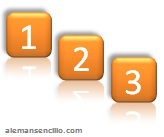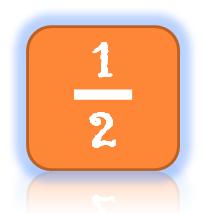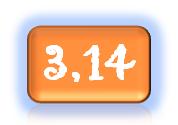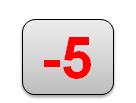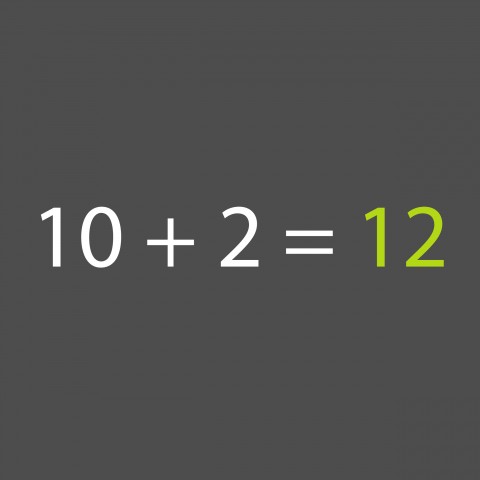The German word for three is
drei
German Definition
| three | |
| Numerale: | |
| [1] Kardinalzahl: drei | |
| [1] Three apples and three pears are in the basket. | |
| Es sind drei Äpfel und drei Birnen im Korb. |
Translations for three and their definitions
| drei |  |
|
| num. three |
| Drei | |
| n. three (digit/figure 3) |
Pronunciation
Dictionary
More German words for Numbers 1-50
All vocabulary sets
Random Quiz:
Wie lautet das Wort für wing?
Start learning German vocabulary
Learn words for Numbers 1-50 with
Multiple Choice
0%
Bingo
0%
Hidden Image
0%
Hangman
0%
Word Search
0%
Crosswords
0%
Flash CardsMemory
Today you will learn the German numbers 1 up to 999,999.
No need to learn all numbers by heart ❌ There’s a system.
Counting in German is easy if you do it right!
Numbers One to Five in German
Let’s start simple.
Listen to the numbers in German 12345 and also the 4 vocabulary words you need for the exercise further down the page.
| eins (1) | one |
| zwei (2) | two |
| drei (3) | three |
| vier (4) | four |
| fünf (5) | five |
| Was ist…? | What is…? |
| plus | plus |
| minus | minus |
| gleich | equals |
German numbers | How to count in German (1 to 999,999)
Now it’s getting serious.
But don’t worry, you don’t need to learn all German numbers up to 999,999 by heart. If you see the pattern you are able to continue the series of numbers by yourself.
By the way, usually we don’t write numbers in words. We write one to ten in words, then we write just numbers 11, 12, 13, 14, 15 …
Please also note that in some cases the g at the end of a word sounds rather like a ch especially when the word ends with ig.
Let’s listen to the numbers in German, starting with one in German
Counting in German 1 to 10
1 = eins
2 = zwei
3 = drei
4 = vier
5 = fünf
6 = sechs
7 = sieben
8 = acht
9 = neun
10 = zehn
The German numbers from 11 to 20 can also be a little tricky
11 = elf
12 = zwölf
13 = dreizehn
14 = vierzehn
15 = fünfzehn
16 = sechzehn
17 = siebzehn
18 = achtzehn
19 = neunzehn
20 = zwanzig
Here you can clearly see the pattern in the numbers
21 = einundzwanzig
22 = zweiundzwanzig
23 = dreiundzwanzig
24 = vierundzwanzig
25 = fünfundzwanzig
30 = dreißig
31 = einunddreißig
32 = zweiunddreißig
33 = dreiunddreißig
40 = vierzig
50 = fünfzig
60 = sechzig
70 = siebzig
80 = achtzig
90 = neunzig
100 = einhundert (hundert)
101 = einhunderteins
102 = einhundertzwei
103 = einhundertdrei
110 = einhundertzehn
111 = einhundertelf
120 = einhundertzwanzig
121 = einhunderteinundzwanzig
130 = einhundertdreißig
131 = einhunderteinunddreißig
140 = einhundertvierzig
150 = einhundertfünfzig
200 = zweihundert
201 = zweihunderteins
210 = zweihundertzehn
300 = dreihundert
400 = vierhundert
1.000 = eintausend (tausend)
1.001 = eintausendeins
1.100 = eintausendeinhundert
2.000 = zweitausend
3.000 = dreitausend
10.000 = zehntausend
100.000 = einhunderttausend
999.999
= neunhundertneunundneunzigtausendneunhundertneunundneunzig
Calculate with the German numbers 1 to 5
Now you will learn how to calculate in German.
Don’t worry, it is not that difficult.
Have you listened to the vocabulary words from the top of the page? Now you need them. Try to answer the questions out loud.
One to five in German – Questions and Answers
Frage:
Was ist eins und eins? (1 + 1)
Kurze Antwort:
Zwei
Lange Antwort:
Eins und eins ist zwei.
Was ist eins plus zwei? (1 + 2)
Drei
Eins plus zwei ist drei.
Was ist vier minus drei? (4 – 3)
Eins
Vier minus drei ist eins.
Was ist fünf minus eins? (5 – 1)
Vier
Fünf minus eins ist vier.
Oder: Fünf minus eins ist gleich vier.
Und was ist drei plus zwei? (3 + 2)
Fünf
Drei plus zwei ist gleich fünf.
Was ist 789621598 + 45968521255?
Ich mache nur Spaß!
Just kidding.
Period or comma in numbers?
I know that the use of the comma and the period in German numbers often leads to confusion. You just have to remember the following:
In German we use the comma as the decimal separator and the period as the thousands separator.
In Germany it is in contrast to e.g. England. In England you write it the other way around.
In Germany:
one thousand = 1.000
In England:
one thousand = 1,000
Here you can learn the German punctuation.
Es spielt keine Rolle, wie langsam du gehst, solange du nicht aufhörst.
= It does not matter how slowly you go as long as you do not stop.
~ Confucius
You can learn much more than just counting in German if you want. My subscribers get step-by-step access to many more lessons.
Have look and learn German online free.
Happy Subscribers
%
Success rate after 6-8 months
German teacher with 14 years of experience
Share the knowledge …
… with your friends and classmates.
Use the social media buttons! 👍
Cardinal numbers, ordinals, decimals, fractions, expressing prices in English and German
- 1 Cardinal numbers. Grundzahlen:
- 2 Ordinal numbers (Ordnungszahlen)
- 3 Fractions (Bruchzahlen)
- 4 Decimal Numbers
- 5 Prices
- 6 Positive and Negative Numbers
- 7 Declension of cardinal numbers
- 7.1 Declension of 1 (eins)
- 7.2 Declension of 2 and 3
- 8 Declension of ordinal numbers
Cardinal numbers. Grundzahlen:
| German/Deutsch | English/Englisch | |
|---|---|---|
| 0 | null | zero |
| 1 | eins | one |
| 2 | zwei | two |
| 3 | drei | three |
| 4 | vier | four |
| 5 | fünf | five |
| 6 | sechs | six |
| 7 | sieben | seven |
| 8 | acht | eight |
| 9 | neun | nine |
| 10 | zehn | ten |
| 11 | elf | eleven |
| 12 | zwölf | twelve |
| 13 | dreizehn | thirteen |
| 14 | vierzehn | fourteen |
| 15 | fünfzehn | fifteen |
| 16 | sechzehn | sixteen |
| 17 | siebzehn | seventeen |
| 18 | achtzehn | eighteen |
| 19 | neunzehn | nineteen |
| 20 | zwanzig | twenty |
| 21 | einundzwanzig | twenty-one |
| 22 | zweiundzwanzig | twenty-two |
| 23 | dreiundzwanzig | twenty-three |
| 24 | vierundzwanzig | twenty-four |
| 25 | fünfundzwanzig | twenty-five |
| 26 | sechsundzwanzig | twenty-six |
| 27 | siebenundzwanzig | twenty-seven |
| 28 | achtundzwanzig | twenty-eight |
| 29 | neunundzwanzig | twenty-nine |
| 30 | dreißig | thirty |
| 31 | einunddreißig | thirty-one |
| 32 | zweiunddreißig | thirty-two |
| 33 | dreiunddreißig | thirty-three |
| 34 | vierunddreißig | thirty-four |
| 35 | fünfunddreißig | thirty-five |
| 36 | sechsunddreißig | thirty-six |
| 37 | siebenunddreißig | thirty-seven |
| 38 | achtunddreißig | thirty-eight |
| 39 | neununddreißig | thirty-nine |
| 40 | vierzig | forty |
| 41 | einundvierzig | forty-one |
| 42 | zweiundvierzig | forty-two |
| 43 | dreiundvierzig | forty-three |
| 44 | vierundvierzig | forty-four |
| 45 | fünfundvierzig | forty-five |
| 46 | sechsundvierzig | forty-six |
| 47 | siebenundvierzig | forty-seven |
| 48 | achtundvierzig | forty-eight |
| 49 | neunundvierzig | forty-nine |
| 50 | fünfzig | fifty |
| 51 | einundfünfzig | fifty-one |
| 52 | zweiundfünfzig | fifty-two |
| 53 | dreiundfünfzig | fifty-three |
| 54 | vierundfünfzig | fifty-four |
| 55 | fünfundfünfzig | fifty-five |
| 56 | sechsundfünfzig | fifty-six |
| 57 | siebenundfünfzig | fifty-seven |
| 58 | achtundfünfzig | fifty-eight |
| 59 | neunundfünfzig | fifty-nine |
| 60 | sechzig | sixty |
| 61 | einundsechzig | sixty-one |
| 62 | zweiundsechzig | sixty-two |
| 63 | dreiundsechzig | sixty-three |
| 64 | vierundsechzig | sixty-four |
| 65 | fünfundsechzig | sixty-five |
| 66 | sechsundsechzig | sixty-six |
| 67 | siebenundsechzig | sixty-seven |
| 68 | achtundsechzig | sixty-eight |
| 69 | neunundsechzig | sixty-nine |
| 70 | siebzig | seventy |
| 71 | einundsiebzig | seventy-one |
| 72 | zweiundsiebzig | seventy-two |
| 73 | dreiundsiebzig | seventy-three |
| 74 | vierundsiebzig | seventy-four |
| 75 | fünfundsiebzig | seventy-five |
| 76 | sechsundsiebzig | seventy-six |
| 77 | siebenundsiebzig | seventy-seven |
| 78 | achtundsiebzig | seventy-eight |
| 79 | neunundsiebzig | seventy-nine |
| 80 | achtzig | eighty |
| 81 | einundachtzig | eighty-one |
| 82 | zweiundachtzig | eighty-two |
| 83 | dreiundachtzig | eighty-three |
| 84 | vierundachtzig | eighty-four |
| 85 | fünfundachtzig | eighty-five |
| 86 | sechsundachtzig | eighty-six |
| 87 | siebenundachtzig | eighty-seven |
| 88 | achtundachtzig | eighty-eight |
| 89 | neunundachtzig | eighty-nine |
| 90 | neunzig | ninety |
| 91 | einundneunzig | ninety-one |
| 92 | zweiundneunzig | ninety-two |
| 93 | dreiundneunzig | ninety-three |
| 94 | vierundneunzig | ninety-four |
| 95 | fünfundneunzig | ninety-five |
| 96 | sechsundneunzig | ninety-six |
| 97 | siebenundneunzig | ninety-seven |
| 98 | achtundneunzig | ninety-eight |
| 99 | neunundneunzig | ninety-nine |
| 100 | hundert | one hundred |
| 101 | hunderteins | one hundred one |
| 102 | hundertzwei | one hundred two |
| 200 | zweihundert | two hundred |
| 300 | dreihundert | three hundred |
| 400 | vierhundert | four hundred |
| 500 | fünfhundert | five hundred |
| 600 | sechshundert | six hundred |
| 700 | siebenhundert | seven hundred |
| 800 | achthundert | eight hundred |
| 900 | neunhundert | nine hundred |
| 1000 | tausend | a thousand |
| 1001 | eintausendeins tausendeins eintausendundeins tausendundeins |
one thousand one |
| 1002 | eintausendzwei | one thousand two |
| 1100 | eintausendeinhundert | one thousand one hundred |
| 1101 | eintausendeinhunderteins | one thousand one hundred one |
| 2000 | zweitausend | two thousand |
| 3000 | dreitausend | three thousand |
| 100.000 | hunderttausend | one hundred thousand |
| 500.000 | fünfhunderttausend | five hundred thousand |
Large numbers:
| German/Deutsch | English/Englisch | |
|---|---|---|
| 1.000.000 | eine Million | one million |
| 2.000.000 | zwei Millionen | two million |
| 2.000.001 | zwei Millionen eins | two million one |
| 1.000.000.000 | eine Milliarde | one billion |
| 1.000.000.000.000 | eine Billion | one trillion |
- An interesting thing about German which makes it confusing is that the one’s place is said before the tens: einundzwanzig, which literally would be like “one and twenty”.
- The numbers in German are written as one word up to one million.
Ordinal numbers (Ordnungszahlen)
- Rules for making ordinal numbers.
- The 2nd and 4th up to the 19th add the ending -te to the cardinal number.
- From the 20th to the 100th, the 1000th, the 1,000,000th add the ending -ste to the cardinal number.
- The 1st and 3rd numbers are irregular.
| German | English | |
|---|---|---|
| 1. | erste | first |
| 2. | zweite | second |
| 3. | dritte | third |
| 4. | vierte | fourth |
| 5. | fünfte | fifth |
| 6. | sechste | sixth |
| 7. | siebente / siebte |
seventh |
| 8. | achte | eighth |
| 9. | neunte | ninth |
| 10. | zehnte | tenth |
| 11. | elfte | eleventh |
| 12. | zwölfte | twelfth |
| 13. | dreizehnte | thirteenth |
| 14. | vierzehnte | fourteenth |
| 15. | fünfzehnte | fifteenth |
| 16. | sechzehnte | sixteenth |
| 17. | siebzehnte | seventeenth |
| 18. | achtzehnte | eighteenth |
| 19. | neunzehnte | nineteenth |
| 20. | zwanzigste | twentieth |
| 21. | einundzwanzigste | twenty-first |
| 22. | zweiundzwanzigste | twenty-second |
| 23. | dreiundzwanzigste | twenty-third |
| 24. | vierundzwanzigste | twenty-fourth |
| 25. | fünfundzwanzigste | twenty-fifth |
| 26. | sechsundzwanzigste | twenty-sixth |
| 27. | siebenundzwanzigste | twenty-seventh |
| 28. | achtundzwanzigste | twenty-eighth |
| 29. | neunundzwanzigste | twenty-ninth |
| 30. | dreißigste | thirtieth |
| 31. | einunddreißigste | thirty-first |
| 32. | zweiunddreißigste | thirty-second |
| 40. | vierzigste | fortieth |
| 50. | fünfzigste | fiftieth |
| 60. | sechzigste | sixtieth |
| 70. | siebzigste | seventieth |
| 80. | achtzigste | eightieth |
| 90. | neunzigste | ninetieth |
| 100. | hundertste | hundreth |
| 101. | hunderterste | hundred-first |
| 200. | zweihundertste | two-hundredth |
| 300. | dreihundertste | three-hundredth |
| 400. | vierhundertste | four-hundredth |
| 500. | fünfhundertste | five-hundredth |
| 600. | sechshundertste | six-hundredth |
| 700. | siebenhundertste | seven-hundredth |
| 800. | achthundertste | eight-hundredth |
| 900. | neunhundertste | nine-hundredth |
| 1000. | tausendste | thousandth |
| 2000. | zweitausendste | two-thousandth |
| 100 000. | hunderttausendste | hundred-thousandth |
| 1 000 000. | millionste | millionth |
Fractions (Bruchzahlen)
| German/Deutsch | English/Englisch | |
|---|---|---|
| 1/2 | ein halb | (a) half |
| 11/2 | eineinhalb oder anderthalb | one and a half |
| 21/2 | zweieinhalb | two and a half |
| 1/3 | ein Drittel | a third |
| 2/3 | zwei Drittel | two thirds |
| 1/4 | ein Viertel | a fourth |
| 11/4 | ein ein Viertel | one and a fourth |
| 3/4 | drei Viertel | three fourths |
| 1/5 | ein Fünftel | a fifth |
| 34/5 | drei vier Fünftel | three and four fifths |
| 1/11 | ein Elftel | one eleventh |
| 5/12 | fünf Zwölftel | five twelfths |
| 2/13 | zwei Dreizehntel | two thirteenths |
Practical examples:
- 1/2 Liter = half a liter ; 1/2 Liter = einhalb Liter
- 11/2 liters = one and a half liters ; 11/2 Liter = eineinhalb Liter
Decimal Numbers
The decimal numbers are not quite the same in German and English because a comma is used instead of a point.
| German/Deutsch | English/Englisch | |
|---|---|---|
| 0,1 | null Komma eins | zero comma one |
| 0,2 | null Komma zwei | zero comma two |
| 1,1 | eins Komma eins | one comma one |
| 1,11 | eins Komma elf eins Komma eins eins |
one comma eleven |
In some countries like the USA and Mexico, the decimal sign is written as a point and, although decimal sign in Germany is officially a comma, sometimes you hear the literal translation in German:
| German/Deutsch | English/Englisch | |
|---|---|---|
| 0.1 | null Punkt eins | zero point one |
| 0.2 | null Punkt zwei | zero point two |
| 1.1 | eins Punkt eins | one point one |
| 1.11 | eins Punkt elf | one point eleven |
Prices
Prices are expressed with letters in the following way in German:
| German/Deutsch | English/Englisch | |
|---|---|---|
| 0,05 € | fünf Cent | five cents |
| 2 € | zwei Euro | two Euros |
| 2,10 € | zwei Euro zehn (Cent) | two Euro ten |
Positive and Negative Numbers
To show that a number is positive/negative, the words plus/minus are put in front of it.
(+1) plus eins
plus one
(-1) minus eins
minus one
Declension of cardinal numbers
The cardinal numbers are not declined with the exception of 1, 2 and 3.
Declension of 1 (eins)
- If the 1 is not followed by a noun, it is not declined and eins is always used:
Formel eins
Formula one
- If the «1» is followed by a noun, usually the weak declension is used, being equivalent to the indefinite article:
Ich habe eine Lampe
I have a lamp
| Masculine | Feminine | Neuter | Plural | |
| Nominative | ein | eine | ein | — |
| Accusative | einen | eine | ein | — |
| Dative | einem | einer | einem | — |
| Genitive | eines | einer | eines | — |
Declension of 2 and 3
- If the 2 or 3 are not followed by a noun, they are not declined and simply zwei and drei are used:
- If the 2 or 3 are followed by a noun, they are declined only in the genitive in the case of them not being preceded by an article:
Abstand zweier Punkte
Distance of two points
| Plural | |
| Nominative Accusative Dative |
zwei / drei |
| Genitive | zweier / dreier |
Declension of ordinal numbers
Ordinal numbers follow the adjective declension rules.
An example of weak declension (given that the article «der» comes before the ordinal number in the genitive):
Die Kosten der zweiten Wohnung
The expenses of the second home
To supplement this glossary, we recommend you watch a video:
2 Comments
A mistake in number 1001.
Other than that, this is really great! Danke schön!
It’s the language of Einstein, of Euler, of some of the most brilliant minds in history.
And with the reputation German has of being a difficult language, you’d think that the numbering system would be formidable.
Not so! It’s really just as approachable as most other languages—more complex than a few, but not nearly as complicated as others. And numbers in German language-learning really are too essential to skip over.
Since you’re able to read this article in English, you’ve got a great advantage already. It’s easy to map German numbers onto English ones, which you’ll soon find out with our handy German number guide here on GermanPod101.com! With our German numbers lists and useful information on how to use them, your numbers in German vocabulary will be strong indeed.
Table of Contents
- Cardinal Numbers
- Writing Numbers Down
- Special Numbers with Special Sounds
- Ordinal Numbers
- Once, Twice, Thrice
- Fractions and More (Easy) Math
- Lemme Get Your Number
- German Numbers and Dates
- Checking the Time
- Numbers When Shopping
- Conclusion: How GermanPod101 Can Help You Master German!
1. Cardinal Numbers
All right, let’s get right to it. Here are the numbers from zero to twelve in German (you can also look at our Numbers vocabulary list to hear each of the German numbers written down here pronounced). Note that, for the most part, the German numbers 1-20 are pretty regular.
| Number | German | English |
|---|---|---|
| 0 | Null | Zero |
| 1 | Eins | One |
| 2 | Zwei | Two |
| 3 | Drei | Three |
| 4 | Vier | Four |
| 5 | Fünf | Five |
| 6 | Sechs | Six |
| 7 | Sieben | Seven |
| 8 | Acht | Eight |
| 9 | Neun | Nine |
| 10 | Zehn | Ten |
| 11 | Elf | Eleven |
| 12 | Zwölf | Twelve |
A note about German numbers pronunciation: These numbers already sound awfully close to English. More so when you realize that words starting with “t” in English very often have a counterpart starting with “z” in German—remember the German “z” is pronounced [ts].
While we’re on the topic of pronunciation, let’s recall that an “s” at the beginning of a word is pronounced like “z” in English.
I’ll also mention that we went all the way up to twelve because eleven and twelve are “irregular” in both English and German. What do I mean by that?
Well, look at thirteen through nineteen:
| Number | German | English |
|---|---|---|
| 13 | Dreizehn | Thirteen |
| 14 | Vierzehn | Fourteen |
| 15 | Fünfzehn | Fifteen |
| 16 | Sechzehn | Sixteen |
| 17 | Siebzehn | Seventeen |
| 18 | Achtzehn | Eighteen |
| 19 | Neunzehn | Nineteen |
When talking about the “ten” numbers in English, we use the word “teen” at the end. But in German, it’s clear as day. Couldn’t be simpler. Eight and ten make eighteen. Germans make this easy by using the number and tacking the word for “ten” (zehn) to the end. See, numbers in German language really aren’t that hard!
Once we hit twenty (which is zwanzig) and beyond, that simplicity keeps going—but in a way that may make you do a double-take at first.
| Number | German | English |
|---|---|---|
| 21 | Einundzwanzig | Twenty-one |
| 22 | Zweiundzwanzig | Twenty-two |
| 23 | Dreiundzwanzig | Twenty-three |
Yes, it’s backwards from what we’re used to. Remember that old rhyme “four-and-twenty blackbirds baked in a pie?” Imagine we talked like that all the time, and you’ve got modern German.
But if you think about it, it really is just keeping the same pattern from thirteen through nineteen. “Eight-ten, nine-ten, twenty, one-and-twenty, two-and-twenty…”
The same pattern continues as long as you’ve got anything in the tens and ones place.
- Fünftausendzweihundert
Five-thousand two-hundred - Zweiunddreißigtausendsechshundertfünfundfünfzig
Thirty-two thousand six-hundred fifty-five.
Yeah, they’re all one word, up to the millions at least.
- Drei Million vierhunderttausend
Three-million four-hundred-thousand
Watch out here: in German, the really big numbers are false friends.
- Die Million, die Milliarde, die Billion
The million, the billion, the trillion
2. Writing Numbers Down
In Europe—not just Germany—most people write numbers with commas and decimals flipped from the way we use them in many English-speaking countries.
To separate hundreds, Germans use spaces or periods instead of commas.
- 35 000/35.000
35,000
And it’s even called das Komma!
- 3,3 Million (drei Komma drei Millionen)
3.3 million (three point three million)
Lastly, prices are expressed this way too, though we’ll go into that a little bit later.
- €13,45
€13.45
3. Special Numbers with Special Sounds
You know how airplane pilots in English always say stuff like “That’s Victor-seven-four-niner, over?” They say “niner” so that nobody confuses “nine” with “five.”

People reading out numbers in German will often say “zwo” for the same reason—nobody wants to confuse zwei and drei when the stakes are high!
In English, we have the special numbers “score” and “dozen,” meaning 20 and 12 units of something, respectively. “Score” was brought to England by the Vikings, but “dozen” is old enough to be in both German and English. You’ll find it in your German dictionary under Das Dutzend.
4. Ordinal Numbers
If you’ve had to learn English as a foreign language, you’ll be thrilled to hear that German ordinal numbers are much simpler than those in English.
Well, sort of. Here’s how they look in their nominative forms:
| Numeral | German | English |
|---|---|---|
| 1st | Erste | First |
| 2nd | Zweite | Second |
| 3rd | Dritte | Third |
| 4th | Vierte | Fourth |
| 5th | Fünfte | Fifth |
| 6th | Sechste | Sixth |
That’s right, they all end in –te!
So what’s the bad news? Well, they all have to follow the rules of German adjectives.
On the one hand, you’re just learning a bunch more adjectives and they’re all regular and predictable. Nothing too serious there.
On the other hand, you do have to stop and think about the cases when you use these words—at least until it all becomes automatic.
When writing these down, Germans follow other European conventions and simply put a full stop after the number to indicate that it’s an ordinal. There’s no written hint to tell you about the declension, unfortunately.
- 4. Stock (vierter Stock)
Fourth floor - zum 3. Mal (zum dritten Mal)
For the third time - am 12. Mai (am zwölften Mai)
On the twelfth of May
5. Once, Twice, Thrice
The word “time,” as in “there’s a first time for everything,” is mal in German. So the words for “once,” “twice,” “thrice,” and so on are simply einmal, zweimal, and dreimal. And where English stops at two or three (depending on if you like the word “thrice” or not), German continues ad infinitum.
- Man lebt nur einmal.
You only live once.
The word mal in German also carries the same meaning as “times” when talking about how many times larger, smaller, and so on that two things can be in comparison to each other.
- Fünfmal so breit.
Five times as wide.
One thing surprisingly absent from all of my German classes in school is how Germans order things at counter-service bakeries or restaurants. In our numbers in German lessons, we’ll try to cover this so you’re not left dazed and confused when ordering!
- Einmal Brezel, bitte.
One pretzel, please.
You’ll hear this used in every German city you go to, so you can likely use it wherever you go. If you go to order some food and it turns out that you’re not understood, simply go with ich hätte gern ein…bitte (meaning “I would like a…” in English) instead.
6. Fractions and More (Easy) Math
Are you out of school? You might have thought you wouldn’t need any math in your foreign language, but as it happens, basic math words are an important part of being able to use German effectively and precisely.
And it’s something that people tend to use in speech without thinking, maybe saying under their breath something like “let me see, that’s…thirty-five divided by seven…five dollars each!” If those numbers relate to you, you’re going to want to understand what’s going on.
There are three different words for “equals”: ergibt, ist, and macht.
- Fünf plus zehn macht fünfzehn.
Five plus ten equals fifteen. - Zwanzig minus dreizehn ist sieben.
Twenty minus thirteen equals seven. - Neunundneunzig durch neun ergibt elf.
Ninety-nine divided by nine equals eleven. - Zwölf mal zwölf macht einhundertvierundvierzig.
Twelve times twelve equals one-hundred forty-four.
As in English, a word for “times; by; multiplied by” is also used for noting dimensions of physical objects.
- Das Zimmer ist sechs Meter mal sieben Meter.
The room is six meters by seven meters.
Now, let’s take a look at fractions and percents. As in English, there are specific nouns meaning “an Xth part of,” and in German they’re just as regular. Check this out:
| German | English |
|---|---|
| Die Hälfte | The half |
| Das Drittel | The third |
| Das Viertel | The fourth |
| Das Fünftel | The fifth |
| Das Sechstel | The sixth |
| Das Zehntel | The tenth |
- Er hat ein Viertel einer Flasche Whiskey getrunken.
He drank a fourth of a bottle of whiskey.
Percentages in German work exactly the same as in English, with one word that’s practically the same in both languages.
- Ich verstehe vielleicht neunzig Prozent.
I understand about ninety percent.
7. Lemme Get Your Number
In English, when we tell someone our phone number, we usually break it up into sections. This varies, of course, depending on where you’re from. For example, American telephone numbers have a three-digit area code, and the number itself is broken up into two groups of three and four numbers. Or in Morocco, phone numbers are broken up into five groups of two numbers.
In Germany, phone numbers used to be of no fixed lengths. Some numbers were as short as two digits!
However, in 2010, the telecoms agreed on a new plan to use eleven-digit numbers for all subsequent landlines. It’s still not entirely consistent (think of how many people you know that haven’t changed their number for eight years), but more so than it was before. Germans usually separate the area code from the regular number with a slash like this:
- Meine Nummer ist 0125/12345678.
My number is (0125) – 12345678.
Why so much detail here? Well, when you’re giving or taking a phone number down, it’s surprisingly easy to be caught off guard by the numbers being too few or too many than you’re used to.
8. German Numbers and Dates
Giving the date in German is only slightly different from doing so in English. We use the ordinal forms in both languages.
- Heute ist der vierte Mai.
Today is the 4th of May.
The definite article “the” isn’t necessary here in German. It would be necessary if we were specifying a specific day, week, month, or year, like so:
- Die dritte Woche in Januar.
The third week in January.
How about talking in terms of decades or centuries? After all, German culture has been around for a long time.
In German, as in English, we don’t say “the ninety decade”; we just say “the nineties.” There are two words for “decade,” incidentally, and those are: das Jahrzehnt and die Dekade.
- die Achtziger [note that this is written as “80er”]
the eighties
Jahrzehnt is wonderfully clear in meaning—it’s literally “year-ten.” How about century?
- 18. Jahrhundert
18th century
Remember that this “18.” is actually pronounced achtzehnte.
9. Checking the Time
The first thing you’ll notice is that Germany, like most of the world, uses the 24-hour clock as standard. So definitely get used to that before you visit.
Saying the hour is a little different than what we’ve been doing with years. You just use the cardinal number without any kind of declension.
- Es ist dreizehn Uhr.
It’s 13 o’clock (one o’clock).
This is what you’ll see posted on shop signs and in any kind of official correspondence. However, just because something is standard doesn’t make it universal. There are plenty of people who use the 12-hour clock when speaking.
When it’s necessary to distinguish between a.m. and p.m., they’ll use vormittags for the morning, nachmittags for the afternoon, abends for the evening, and nachts for the night.
- Es ist drei Uhr nachts, was machst du gerade so?!
It’s three a.m., what are you doing?!
- Unser Termin ist morgen um 9 Uhr vormittags.
Our meeting is tomorrow at 9 a.m.
There’s one more peculiarity about telling time in German, and that’s the way they talk about halves of hours.
They literally say “half of the next hour” to say what English-speakers know as “half past.”
- Jetzt ist es halb sechs.
Now it’s half past five.
This can be really confusing if you don’t know to look out for it. Remember that Germans value punctuality!
10. Numbers When Shopping
When you go out to buy a Currywurst or Schinkenbrot, you’ll need to understand the prices you hear at the register. There’s no sales tax added on after the price, but you’ll learn that prices tend to slide right out of your memory when you’re bringing your breakfast pastry to the register—especially in a foreign language!
By the way, in Germany, it’s still extremely common to pay in cash. Most tiny shops either reluctantly take credit cards or not at all, and you can forget about mobile pay.
Better get used to counting out coins, though a lot of shops round to the nearest five cents so you don’t have to deal with the one- and two-cent Euro coins anymore (das ein-Cent-Stück and das zwei-Cent-Stück, respectively).
Here’s what you’ll hear when the cashier rings up your total:
- Das macht vier Euro fünfzig. (€4,50)
That’s four euros fifty.
Or:
- Vierzehn Euro achtzig Cent. (€14,80)
Fourteen euros eighty cents.
Guten Appetit! (Enjoy your meal!)
11. Conclusion: How GermanPod101 Can Help You Master German!
It may seem like a ton of detail to remember right now, but there’s no way you need to learn all German numbers at once.
One of the best ways to internalize German numbers at home is to watch documentaries. You’ll constantly hear prices, percentages, hundreds, millions, and more.
And if you’re really ambitious, you could try translating all the digits you see during the day into German. It’s really easy to skip numbers when reading out loud, so by quietly murmuring sale prices or times of the day in German while you’re out and about, you’ll build up that skill of automatically switching to German numbers.
Then when it’s time to use them for real, you won’t stumble at all. So go out there and enjoy our world of numbers—our Nummernwelt—in German!
GermanPod101.com wants to be here with you for each step of your journey to German mastery! We provide practical learning tools for every learner, including insightful blog posts like this one, free German vocabulary lists, an online community forum, and even a MyTeacher program for those with a Premium Plus account! With your determination and our support, you’ll know German culture and the German language inside and out!
Author: Yassir Sahnoun is a HubSpot certified content strategist, copywriter and polyglot who works with language learning companies. He helps companies attract sales using content strategy, copywriting, blogging, email marketing & more.
Subjects>Jobs & Education>Education
Wiki User
∙ 13y ago
Best Answer
Copy
The German word for three is drei.
Wiki User
∙ 13y ago
This answer is:
Study guides
Add your answer:
Earn +
20
pts
Q: What is the German word for three?
Write your answer…
Submit
Still have questions?
Related questions
People also asked
Whoops, we thought your browser supported HTML5 audio and it doesn’t. Click here to report the issue.
null
eins
zwei
drei
vier
fünf
sechs
sieben
acht
neun
zehn
elf
zwölf
dreizehn
vierzehn
fünfzehn
sechzehn
siebzehn
achtzehn
neunzehn
zwanzig
einundzwanzig
zweiundzwanzig
dreiundzwanzig
vierundzwanzig
fünfundzwanzig
sechsundzwanzig
siebenundzwanzig
achtundzwanzig
neunundzwanzig
dreißig
einunddreißig
zweiunddreißig
dreiunddreißig
vierunddreißig
fünfunddreißig
sechsunddreißig
siebenunddreißig
achtunddreißig
neununddreißig
vierzig
einundvierzig
zweiundvierzig
dreiundvierzig
vierundvierzig
fünfundvierzig
sechsundvierzig
siebenundvierzig
achtundvierzig
neunundvierzig
fünfzig
einundfünfzig
zweiundfünfzig
dreiundfünfzig
vierundfünfzig
fünfundfünfzig
sechsundfünfzig
siebenundfünfzig
achtundfünfzig
neunundfünfzig
sechzig
einundsechzig
zweiundsechzig
dreiundsechzig
vierundsechzig
fünfundsechzig
sechsundsechzig
siebenundsechzig
achtundsechzig
neunundsechzig
siebzig
einundsiebzig
zweiundsiebzig
dreiundsiebzig
vierundsiebzig
fünfundsiebzig
sechsundsiebzig
siebenundsiebzig
achtundsiebzig
neunundsiebzig
achtzig
einundachtzig
zweiundachtzig
dreiundachtzig
vierundachtzig
fünfundachtzig
sechsundachtzig
siebenundachtzig
achtundachtzig
neunundachtzig
neunzig
einundneunzig
zweiundneunzig
dreiundneunzig
vierundneunzig
fünfundneunzig
sechsundneunzig
siebenundneunzig
achtundneunzig
neunundneunzig
einhundert, hundert
einhundertundeins, hunderteins
einhundertundzwei, hundertzwei
zweihundert
eintausend
zehntausend
einhunderttausend, hunderttausend
eine Million
eine Milliarde
eine Billion
Learn how to say numbers in German.
Cardinal numbers
| null | zero |
| eins | one |
| zwei | two |
| drei | three |
| vier | four |
| fünf | five |
| sechs | six |
| sieben | seven |
| acht | eight |
| neun | nine |
| zehn | ten |
| elf | eleven |
| zwölf | twelve |
| dreizehn | thirteen |
| vierzehn | fourteen |
| fünfzehn | fifteen |
| sechzehn | sixteen |
| siebzehn | seventeen |
| achtzehn | eighteen |
| neunzehn | nineteen |
| zwanzig | twenty |
| einundzwanzig | twenty-one |
| zweiundzwanzig | twenty-two |
| dreiundzwanzig | twenty-three |
| vierundzwanzig | twenty-four |
| fünfundzwanzig | twenty-five |
| sechsundzwanzig | twenty-six |
| siebenundzwanzig | twenty-seven |
| achtundzwanzig | twenty-eight |
| neunundzwanzig | twenty-nine |
| dreißig | thirty |
| einunddreißig | thirty-one |
| zweiunddreißig | thirty-two |
| dreiunddreißig | thirty-three |
| vierunddreißig | thirty-four |
| fünfunddreißig | thirty-five |
| sechsunddreißig | thirty-six |
| siebenunddreißig | thirty-seven |
| achtunddreißig | thirty-eight |
| neununddreißig | thirty-nine |
| vierzig | forty |
| einundvierzig | forty-one |
| zweiundvierzig | forty-two |
| dreiundvierzig | forty-three |
| fünfzig | fifty |
| sechzig | sixty |
| siebzig | seventy |
| achtzig | eighty |
| neunzig | ninety |
| einhundert | one hundred |
| einhundertundeins | one hundred and one |
| zweihundert | two hundred |
| dreihundert | three hundred |
| eintausend | one thousand |
| zweitausend | two thousand |
| dreitausend | three thousand |
| eine Million | one million |
| eine Milliarde | one billion |
Repetition
| einmal | once |
| zweimal | twice |
| dreimal | three times |
| viermal | four times |
| fünfmal | five times |
|
German vocabulary |
|
|---|---|
| Page 1 of 6 | |
|
➔ Contents |
Colours
➔ |
Ordinal numbers
| erste | first |
| zweite | second |
| dritte | third |
| vierte | fourth |
| fünfte | fifth |
| sechste | sixth |
| siebte | seventh |
| achte | eighth |
| neunte | ninth |
| zehnte | tenth |
| elfte | eleventh |
| zwölfte | twelfth |
| dreizehnte | thirteenth |
| vierzehnte | fourteenth |
| fünfzehnte | fifteenth |
| sechzehnte | sixteenth |
| siebzehnte | seventeenth |
| achtzehnte | eighteenth |
| neunzehnte | nineteenth |
| zwanzigste | twentieth |
| einundzwanzigste | twenty-first |
| zweiundzwanzigste | twenty-second |
| dreiundzwanzigste | twenty-third |
| dreißigste | thirtieth |
| vierzigste | fortieth |
| fünfzigste | fiftieth |
| sechzigste | sixtieth |
| siebzigste | seventieth |
| achtzigste | eightieth |
| neunzigste | ninetieth |
Other useful words
| um or ungefähr | about |
| über or mehr als | over |
| unter or weniger als | under |
Examples
| 36 | 36 |
| 54 | 54 |
| 89 | 89 |
| 106 | 106 |
| 123 | 123 |
| 678 | 678 |
| 3 294 | 3,294 |
| 9 755 | 9,755 |
| 2 608 411 | 2,608,411 |
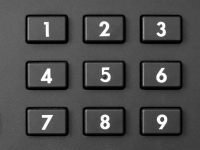
In this lesson of the Learn German course, you’ll learn the German words for both
cardinal numbers (1, 2, 3) and ordinal numbers (first, second, third).
Online flashcards an a quiz are included to help you learn the German words
for the cardinal and ordinal numbers.
German Vocabulary
Cardinal Numbers
| 0 | null |
| 1 | eins |
| 2 | zwei |
| 3 | drei |
| 4 | vier |
| 5 | fünf |
| 6 | sechs |
| 7 | sieben |
| 8 | acht |
| 9 | neun |
| 10 | zehn |
| 11 | elf |
| 12 | zwölf |
| 13 | dreizehn |
| 14 | vierzehn |
| 15 | fünfzehn |
| 16 | sechzehn |
| 17 | siebzehn |
| 18 | achtzehn |
| 19 | neunzehn |
| 20 | zwanzig |
| 21 | einundzwanzig |
| 22 | zweiundzwanzig |
| 23 | dreiundzwanzig |
| 24 | vierundzwanzig |
| 25 | fünfundzwanzig |
| 26 | sechsundzwanzig |
| 27 | siebenundzwanzig |
| 28 | achtundzwanzig |
| 29 | neunundzwanzig |
| 30 | dreißig |
| 40 | vierzig |
| 50 | fünfzig |
| 60 | sechzig |
| 70 | siebzig |
| 80 | achtzig |
| 90 | neunzig |
| 100 | einhundert |
| 1,000 | eintausend |
| 10,000 | zehntausend |
| 100,000 | einhunderttausend |
| 1,000,000 | eine Million |
Ordinal Numbers
| first | erste |
| second | zweite |
| third | dritte |
| fourth | vierte |
| fifth | fünfte |
| sixth | sechste |
| seventh | siebte |
| eighth | achte |
| ninth | neunte |
| tenth | zehnte |
| eleventh | elfte |
| twelfth | zwölfte |
| twentieth | zwanzigste |
| thirtieth | dreißigste |
| fortieth | vierzigste |
| fiftieth | fünfzigste |
| hundredth | hundertste |
Flashcards
Here are some flashcards to help you learn the German words for ordinal
and cardinal numbers.
Practice
The best way to learn a language is to practice speaking, writing, and thinking in the
language you want to learn. In this section you have the opportunity to practice writing
the German words for numbers in sentences.
Write each sentence using the German word for the number in parentheses.
Karl hat ___ Katzen. (three)
Karl hat drei Katzen.
Die Prüfung hat ___ Fragen. (fifty)
Die Prüfung hat fünfzig Fragen.
Ich habe ___ Hemden. (seven)
Ich habe sieben Hemden.
Es gibt ___ Bücher auf dem Tisch. (ten)
Es gibt zehn Bücher auf dem Tisch.
Ich sehe ___ Leute im Laden. (twelve)
Ich sehe zwölf Leute im Laden.
Quiz
See how well you know the German words for numbers with this online quiz. Each
time you take the quiz the questions will be a bir different. Press the Start
button to begin.

